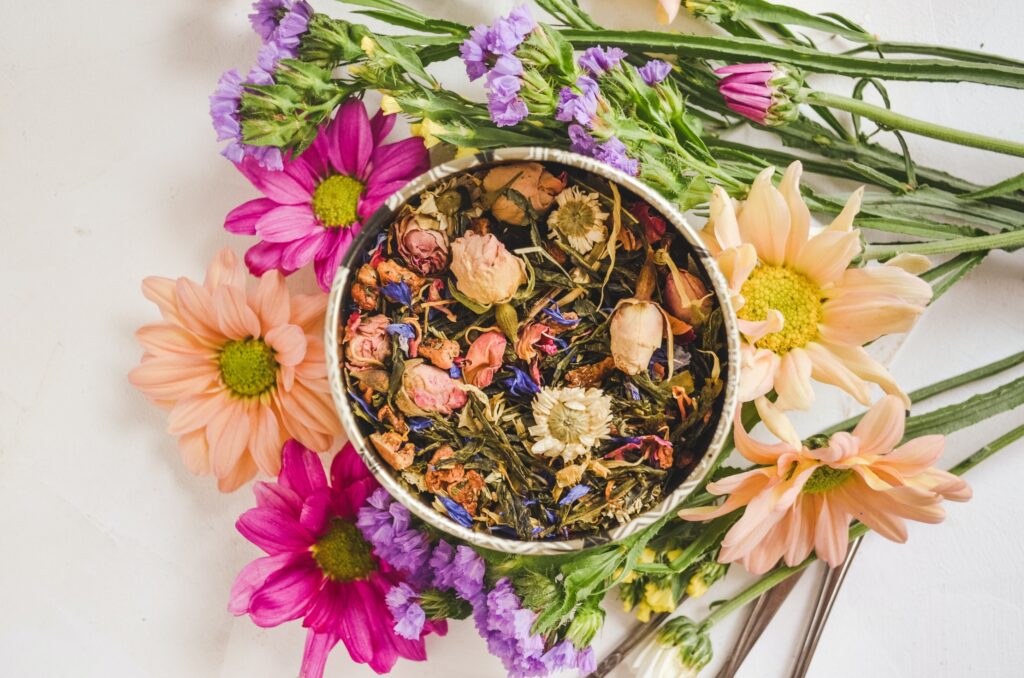Are you looking for the best herbs for lymph nodes? The Lymph nodes are an essential part of our immune system, as they help filter and trap harmful substances that enter our body. However, sometimes they can become swollen or enlarged, indicating an underlying infection or other medical condition.
Certain herbs have been used for centuries to help support lymphatic system and promote overall health. Let’s dig deeper into the world of herbs for lymph nodes.
Overview of the Lymphatic System and Its Role in the Body

The human body is a complex mechanism with numerous organ systems working together to keep us healthy; one of these critical systems is the lymphatic system. The lymphatic system is a complex network of vessels, tissues, and organs that play a role in the immune system. This system helps maintain fluid balance, remove waste, and fight infections. Let’s take an overview of the Lymphatic System.
⬤The Lymphatic System’s Anatomy
The lymphatic system centers around the vessels, similar to veins, in their structure and function. These vessels transport lymph, a clear fluid that contains white blood cells, throughout the body. The lymphatic system includes organs such as the spleen, tonsils, adenoids, and thymus gland. The lymph glands act as filters, removing viruses and bacteria from the fluids that pass through them. The lymphatic system also includes a significant organ known as the bone marrow. This organ produces white blood cells, which fight off infections.
⬤The Lymphatic System’s Function
The lymphatic system has three major functions in the body:
- It helps maintain fluid balance by collecting excess fluid and proteins that would otherwise accumulate in the tissues and cause swelling.
- The lymphatic system helps to eliminate waste products such as bacteria, viruses, dead cells, and other cellular debris from the body.
- The lymphatic system plays a crucial role in the immune system as leukocytes (white blood cells) within lymphatic fluid identify and neutralize foreign substances, like viruses or bacteria, that could cause illness.
⬤The Lymphatic System’s Role in the Immune System
The immune system is essential to the body’s defense mechanism against infections. It is responsible for identifying and fighting harmful substances within the body and preventing infection. The lymphatic system plays a vital role in the immune system by helping to identify and eliminate foreign substances in the body. The lymphatic system also helps regulate the production of white blood cells, which neutralize pathogens that enter the body.
Several factors can affect the lymphatic system and its functions, leading to illnesses. One of the significant problems that could arise is lymphedema. This condition occurs when lymphatic fluid accumulates in the tissues, resulting in swelling of affected limbs. An infection of the lymphatic system called lymphangitis can result in red, painful, and swollen tracks. To protect your lymphatic system, maintain a healthy lifestyle by eating a balanced diet, exercising regularly, and avoiding prolonged sitting, which can increase the risk of lymphedema.
The Importance of Reducing Swollen Lymph Nodes
Swollen lymph nodes are a sign that the immune system is working overtime to prevent an infection from spreading. However, if swollen lymph nodes are left untreated, they can lead to severe health issues. That’s why reducing swollen lymph nodes is crucial to maintaining good health.
✔️Chronic Fatigue and Soreness
One of the most common symptoms of swollen lymph nodes is fatigue and soreness. When lymph nodes swell, the body has to put in extra effort to fight off infections and viruses. This extra effort puts a strain on your body, leaving you feeling extremely tired and sore. You can improve your energy levels and reduce soreness by reducing swelling and inflammation.
✔️Reduce Pain and Discomfort
Swollen lymph nodes can be extremely painful and uncomfortable. They can cause stiffness, aches, and pains throughout the entire body. Reducing the swelling and inflammation of lymph nodes can help alleviate these symptoms. You can reduce the swelling by applying a cold compress to the affected area. You may also find relief by taking over-the-counter painkillers such as ibuprofen or acetaminophen.
✔️Prevention of Infections and Diseases
Swollen lymph nodes often indicate an infection somewhere in the body. However, infectious agents can lead to severe health problems if left untreated. Reducing the swelling can help speed up the healing process and prevent the infection from becoming more serious. Addressing swollen lymph nodes can also help reduce the risk of more severe illnesses.
✔️Improved Immune System
The lymphatic system is one of the body’s key defenses against infections and viruses. By reducing swollen lymph nodes, you help your body fight the current infection and improve your overall immune system. Your immune system will be better prepared to combat future infections and viruses.
✔️Better Quality of Life
Dealing with swollen lymph nodes can be inconvenient and painful. Reducing swelling and the ensuing discomfort can lead to a better quality of life. You will have more energy, feel less pain, and be able to live more comfortably.
While swollen lymph nodes can indicate many issues, managing them can help address potential health concerns, reduce symptoms, and avoid more serious illnesses. If you are experiencing swollen lymph nodes, see your healthcare professional, and discuss treatment options.
Herbs for Lymph Nodes Drainage and Cleansing

Herbs have been used for centuries to promote lymphatic cleansing and lymphatic drainage herbs supplements, reducing inflammation and swelling of the lymph nodes. I will share the best herbs for lymph nodes and their uses.
🌿RED CLOVER
Red Clover, also known as Trifolium pratense, is one of the best supplements for lymphatic drainage from the same family as peas and beans. It is native to Europe and Asia, but you can now find it growing in other parts of the world, including America and Australia. This herb has been used for centuries in traditional medicine to treat various ailments, such as skin disorders, respiratory problems, and even cancer. However, thanks to its impressive anti-inflammatory and antispasmodic properties, its most significant use is for treating swollen lymph nodes.
One of the key health benefits of Red Clover is its ability to boost the immune system. This herb contains compounds such as isoflavones and coumarins that help enhance our body’s natural defense mechanism against viruses, bacteria, and other pathogens. By strengthening our immune system, Red Clover reduces the risk of developing infections that can lead to swollen lymph nodes.
Red Clover is also known to have an excellent impact on women’s health. This herb contains compounds that mimic estrogen, a crucial hormone in a woman’s reproductive system. By mimicking estrogen, Red Clover can help alleviate symptoms associated with menopause, such as hot flashes, irritability, and mood swings.
HOW TO USE RED CLOVER FOR LYMPH NODES
When it comes to using Red Clover, you have several options. You can consume it as a tea, capsule, or tincture. However, drinking Red Clover tea is the most popular method. To make the tea, you must steep one or two teaspoons of dried Red Clover flowers in boiling water for 10 to 15 minutes. You can drink it two to three times a day to get the best results.
Another way to incorporate Red Clover into your daily routine is by making a salve or poultice. This method treats external conditions, such as skin rashes, cuts, and bruises. In order to make a salve or poultice, mix dried Red Clover flowers with a carrier oil such as olive or coconut oil. Apply the mixture to the affected areas for relief.
🌿ECHINACEA
Echinacea, a native North American coneflower, has a rich history and was a staple in Native American traditional medicine. The Native Americans first discovered Echinacea’s benefits, using it primarily to combat infections and wounds. Today, it is celebrated worldwide for its potent healing properties, particularly related to the immune system and lymphatic drainage.
Echinacea stands out for its diverse benefits, particularly its effectiveness in reducing lymph node swelling and boosting the immune system. Containing active substances that enhance the activity of the immune system, reduce inflammation, and have antiviral and antioxidant effects, Echinacea is a powerful ally in treating swollen lymph nodes. It improves lymphatic function by purifying the blood, alleviating lymph node swelling and promoting general health and well-being.
The use of Echinacea extends beyond its internal benefits. Thanks to its anti-inflammatory and antibacterial properties, it is also known to accelerate wound healing and soothe skin conditions. Echinacea’s high polysaccharide concentration stimulates the cells responsible for wound healing, enhancing skin health and relieving discomfort from skin conditions.
HOW TO USE ECHINACEA FOR LYMPH NODES
It is one of the best herbs for lymphatic system. Echinacea can be consumed in various forms, such as tea, supplements, and tinctures, with each form offering a slightly different concentration of Echinacea; for a soothing Echinacea tea, steep a teaspoon of dried Echinacea in boiling water for about 15 minutes. Drinking this green tea can help stimulate the immune system and promote lymphatic drainage.
Alternatively, Echinacea supplements are available in capsule or liquid form and are usually taken several times daily following the manufacturer’s guidelines. However, it’s always prudent to consult with a healthcare professional before starting any new supplement regimen.
Remember, the best results come with consistency. Regular use of Echinacea in your wellness regimen can significantly improve lymphatic health and overall well-being.
🌿BURDOCK ROOT
Burdock root, scientifically known as Arctium lappa, is a powerhouse herb with a long-standing history in holistic medicine. Indigenous to Europe and Asia, Burdock root has since been naturalized in many parts of North America. Historically, it was widely used in traditional Chinese and Ayurvedic medicine for its potent therapeutic properties and is still a staple in many natural remedies today.
Its significance in lymphatic health is its ability to stimulate lymphatic drainage, reduce inflammation, and enhance the immune system. Burdock root is rich in antioxidants such as quercetin, luteolin, and phenolic acids, which help to protect the body against cellular damage and fight off pathogens. This herb is also a natural diuretic, assisting in flushing out toxins from the body and consequently reducing the swelling of lymph nodes.
Burdock root also holds a high reputation for its blood-purifying capabilities. By stimulating the elimination of toxins through the skin and urine, it reduces the burden on the lymphatic system, further promoting lymphatic health and function. Its anti-inflammatory properties also make it effective in alleviating symptoms associated with swollen lymph nodes.
HOW TO USE BURDOCK ROOT FOR LYMPH NODES
You can tailor consumption of Burdock root to one’s preference. It can be infused into tea, incorporated in smoothies, or consumed as a supplement. To make a soothing Burdock root tea, boil a teaspoon of dried Burdock root in water for about 15 minutes. Sipping on this brew can stimulate lymphatic function and promote overall health.
Burdock root is also available in capsule or tincture form, providing a more concentrated dose of its benefits. Before starting a new supplement regimen, it’s vital to consult with a healthcare professional to ensure it’s suitable for you.
Incorporating Burdock root into your daily health routine can serve as an excellent preventive measure and a stepping stone to greater lymphatic health and overall well-being.
🌿CALENDULA
Calendula officinalis, also known as pot marigold, is a remarkable herbal remedies from the Mediterranean region. It has been a cornerstone in traditional medicinal practices for centuries, with its uses tracing back to ancient Roman and Greek cultures. This plant’s vibrant orange or yellow flowers were believed to possess magical properties and were utilized in various rituals and ceremonies.
Calendula’s reputation as a powerful healing herb is well-earned, particularly regarding lymphatic health. It is rich in flavonoids and carotenoids, potent antioxidants that protect cells from damage. Additionally, Calendula has impressive anti-inflammatory and antiviral properties, which help enhance the lymphatic system’s performance, reduce inflammation, and combat infections.
Of particular interest is Calendula’s unique ability to encourage lymphatic drainage. By stimulating the lymphatic system, it aids in the removal of waste and toxins from the body, thereby alleviating the symptoms of swollen lymph nodes and promoting overall well-being.
HOW TO USE CALENDULA FOR LYMPH NODES
Calendula, such as tea, topical creams, and tinctures, can be incorporated into your wellness regimen. In order to prepare a soothing Calendula tea, you can steep one to two teaspoons of dried Calendula flowers in boiling water for about 10-15 minutes. This tea can be consumed up to three times daily to boost lymphatic health.
Topical Calendula creams or salves can also alleviate skin inflammatory conditions. Apply the cream to the affected area for relief.
Calendula can offer a more concentrated dosage in the form of a tincture. However, always remember to consult with a healthcare professional before using any new form of supplement.
By consistently incorporating Calendula into your wellness routine, you are setting the stage for better lymphatic health and, consequently, a healthier, more vibrant you.
🌿CLEAVERS
Cleavers, scientifically known as Galium aparine, is an exceptional herb recognized for its beneficial impacts on lymphatic health. Hailing from the Rubiaceae family, Cleavers is a perennial plant native to Europe, North Africa, and Asia. However, its hardy nature has enabled widespread growth across multiple continents, including North America.
Historically, Cleavers was highly regarded for its therapeutic benefits, used by traditional herbalists as a spring tonic or cleanser. It was also often utilized as a poultice for skin conditions, showcasing its versatile nature in herbal medicine.
Cleavers possesses impressive properties that make it a powerful ally for lymphatic health. It is particularly lauded for its ability to stimulate the lymphatic system, promote lymphatic drainage, and aid in removing toxins from the body. This diuretic action assists in reducing the swelling of lymph nodes.
Moreover, Cleavers is rich in antioxidants, which provide protection against cellular damage and bolster overall wellness. Its anti-inflammatory properties further contribute to alleviating symptoms associated with swollen lymph nodes, rendering it exceptionally beneficial for lymphatic health.
HOW TO USE CLEAVERS FOR LYMPH NODES
Cleavers can be conveniently integrated into your health regimen in various forms. A popular choice is Cleavers tea, prepared by steeping a teaspoon of dried Cleavers in boiling water for 10-15 minutes. This soothing tea can enhance lymphatic function and is best consumed regularly for optimum results.
Another option is a Cleavers tincture, which provides a more concentrated dosage of this beneficial herb. As always, it’s crucial to consult with a healthcare professional before incorporating any new supplements into your routine.
Integrating Cleavers into your daily health regimen could serve as a significant stride toward improved lymphatic health and overall well-being. A consistent routine with Cleavers allows you to tap into its potent benefits, contributing to a healthier, more vibrant you.
These are the best herbs for lymph nodes; always remember to take precautions and seek the advice of a healthcare professional before beginning any new natural remedies for lymphatic drainage. In addition to herbs, lifestyle modifications such as brisk walking, healthy eating habits, and proper hydration can be immensely beneficial in maintaining lymphatic health. Small steps towards better wellness today pave the way for a more vibrant tomorrow.
Frequently Asked Questions
Can herbal teas be effective for promoting lymphatic system health?
Yes, herbal teas can be a great way to support the lymphatic system. Some herbs commonly used include red clover, cleavers, and calendula. These herbs are believed to help improve circulation and reduce inflammation in the lymphatic system, which can help to keep it functioning properly.
How long does it typically take to see results from using herbs for lymphatic support?
The answer to this question can vary depending on various factors, including the specific herbs you use, your overall health, and your consistency with your tea regimen. Generally, it can take a few days to a few weeks to start noticing the effects of herbal teas on the lymphatic system.
Are there any contraindications for using certain herbs if someone has a history of lymphatic disorders?
Yes, talking to your healthcare provider before starting any new herbal regimen is always important, especially if you have a history of lymphatic disorders. Some herbs may not be appropriate for everyone, and your healthcare provider can help you determine which herbs are safe and effective for you.
Final Words
After doing extensive research and experimenting with various herbs, I have realized that herbs for lymph nodes are an incredibly effective and natural way to support the immune system. From Echinacea to red clover, there are a plethora of herbs that have powerful anti-inflammatory and immunostimulant properties.
As someone who has struggled with lymphatic congestion and swelling, I can attest to the transformative effects of incorporating these herbs into my daily routine. Not only have they helped to alleviate my symptoms, but they have also provided me with a newfound sense of empowerment and control over my health. By utilizing the healing power of nature, we can encourage our body to do what it does best – heal itself. And for those seeking a natural and non-invasive way to support their lymphatic system, herbs are a powerful ally to have in your arsenal.

